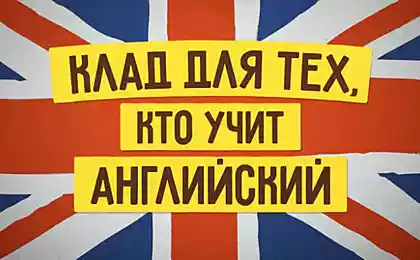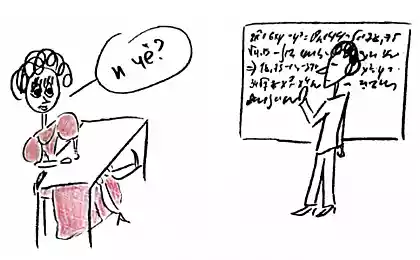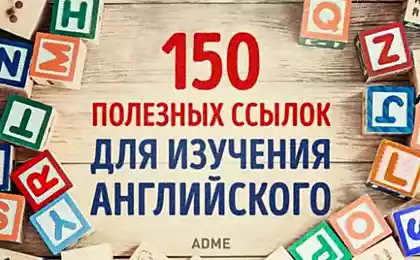1518
As English has become abnormal

Written by linguist John Makuorter (John McWhorter)
No, English is not unique bright, powerful and adaptable. But he, in fact, more strange than a sufficiently large number of other languages.
Native English know that this is a very strange language. They know about it and the people for which it is not native, and that it is taught. That strange, we often notice associated with spelling, and that, in fact, a real nightmare. In those countries where it is not spoken in English without spelling contests. In normal language spelling, at least pretend to be the presence of basic compliance with the way people pronounce the word. However, English is not normal.
Spelling is due, of course, with the writing, while the language is, in fact, has to do with speech. It originated long before the letter, we are talking much more, and about a couple of hundred of thousands of the world's spoken little or no writing. But even in his colloquial English is strange. His oddities can easily fail to notice because the English-speaking residents of the United States and Britain are not particularly eager to learn other languages.
However, our monolingual trend makes us look like the proverbial fish that does not know what it means "wet." Our language is perceived as normal only until such time as the person does not get an idea of what is, in fact, normal language.
There is, for example, a different kind of language, which would be close enough to the English in the sense that half of what people say, it would be possible to understand, never engaged in it, and everything else one would learn, putting little effort . The same can be said of the German and Dutch, as well as Spanish and Portuguese, but also on the Thai and Lao. The closest thing to an English-speaking person may be a little-known northern European language called Frisian: if you know that tsiis - this cheese, and Frysk means "Frisian," it is not difficult to imagine what was meant: Brea, bûter, en griene tsiis is goed Ingelsk en goed Frysk. However, this phrase is artificial, and, in general, we tend to think that the Frisian language more like German that corresponds to reality.
We believe disadvantage that in many European languages, a noun without any reasons were attributed to gender, while the French moon turns out the feminine, and the boat - the male, and the like. But, in fact, the country is we are almost all European languages belong to one family - the Indo-European, and only one of them, in English there is no such category of gender.
Barrister smokes in front of the Central Criminal Court in London. AP Photo, Alastair Grant
Want more examples of strangeness? Okay. On Earth, there is only one language, which now requires a special end only in the third person singular. In this language I write so: I talk, you talk, he / she talk-s - but why. Verbs in the present tense in normal language or do not have all the endings, or have a bunch of different endings (in Spanish: hablo, hablas, habla). And call another language where you need to insert the word for denial do something or to ask a question. Do you find it difficult? Unless you are not originally from Wales, not from Ireland and were not born in the north of France, it is likely that the way it is.
Why is our tongue so strange? And in general, what kind of language that we speak, and why it has become that way?
English is, in fact, began as one of the German. Old English is not so similar to the modern version of what it takes considerable effort in order to consider it in the same language. Hwæt, we gardena in geardagum þeodcyninga þrym gefrunon - is this really means: "And we, the kings Danish heard during the time it is about the glory of kings"? Icelanders today can read such stories written in Old Norse precursor their language 1,000 years ago, and, nevertheless, to the untrained eye poem "Beowulf» (Beowulf) may seem like a work written in Turkish.
The first thing that has removed us from the original language, was as follows: when the Angles, Saxons and Jutes (and friezes) brought their language in England, lived on the island for other people to speak another language. It was the Celtic languages, which are now presented with the Welsh, Irish, and on the other side of the Channel in France, and even Breton. The Celts were enslaved, but survived, and since all were about 250 thousand German invaders - roughly the population of the city as a humble Jersey City - very quickly it turned out that most of the people who spoke Old English, began to make the Celts.
Crucial was the fact that their language is very different from English. For example, the verb was in their first. And the Celts were strange constructions with the verb do: they used it to formulate a question, make an offer to the negative - and even to create a kind of add to the verb: Do you walk? I do not walk. I do walk. Now it looks familiar, because the Celts began to do so in their own version of English. However, before such a proposal would have seemed strange to the English-speaking people - like today it will seem strange in any language other than our own and surviving Celtic. Please note that the very discussion of this strange use of the verb do makes us discover a strange thing - as if you said that in your mouth is always language.
To date, the existence of other languages in the world, except for Celtic and English, in which the verb was used to do the same. Therefore, the strangeness of the English language began with the transformation in the mouth of people, increasingly accustomed to a completely different language. We continue to talk like them, and we do it in a way that we ourselves would not have come to mind. Counting When you say «eeny, meeny, miny, moe», have you ever had the feeling that we are talking about some kind of account? In fact, the way it is - a Celtic figures, which have changed over time, but still we can see that they go back to the words used by the villagers of Britain when they counted the animals, or playing games. But the words of a children's song: «Hickory, dickory, dock» - all that does it all mean? Here's the solution: the words hovera, dovera, dick on the same Celtic language means eight, nine and ten.
Then another event occurred that affected the English language on the island, crossed over from the continent, appeared in a large number of people who were carriers of the German language and who have had very serious. This process began in the IX century, and this time the invaders spoke at another branch of the German language - in the Old Norse. However, they did not impose their language. Instead, they married local women and the transition to the use of the English language. However, these were adults, and adults usually not easy to learn a new language, especially when we are talking about a society where the use of the oral language.
There were no schools and there was no mass media. Learning a language then meant that it was necessary to listen carefully and put great effort to understand. We can only imagine how much we spoke German, if had to just so to teach him - that is, meeting with him in the recorded video, and more on his plate (butchering animals, socializing with people and the like), and not just working on our pronunciation.
While the conquerors were able to report what they wanted, it was ok. But this can be done using a very rough version of the language - the reduced intelligibility of Frisian offers just that and shows. Therefore, the Scandinavians have done exactly what was expected and they spoke Old English poor. Their children are heard as much bad as it is a real Old English. Life went on, and soon they became a real Anglo bad English, and that's what we have today: the Scandinavians did the English language easier.
Here I must make a clarification. In linguistic circles risky to talk about the fact that some language is "better" than another, because there is no uniform system of measurement by which to make an objective rating. But even if there is a light strip between day and night, we would not say that there is no difference between life at 10 am and the life at 10 pm. The same can be said about the language - some of them sounds more bells and whistles than others. If someone said that he was given a year to study either Russian or Hebrew, and then he would have started to pull out a nail for each to make mistakes in the course of a three-minute test to check their knowledge, only a masochist would choose Russian language - unless it is at this time no longer be owned by some related languages. In this sense, the English "better" than the other Germanic languages, and all of the Vikings.
In Old English there were kind of crazy categories, which we expect to find in a good European language - but the Scandinavians special attention to them did not pay, so now they have not. Pay attention to this strange English. In addition, the Vikings have learned only one part of the once beautiful former conjugation system: so in the third person singular, and there is a lonely ending -s, and now it is stuck there like a dead insect on the windshield of the car. Here, as elsewhere, the Vikings smoothed composite material.
They also followed the example of the Celts, and change the language in a way that seemed to them the most natural. Well aware of the fact that they have added thousands of new words in the English language, including those that seem to us exclusively "our": sing an old song «Get Happy» - in the words of the title came to us from the Old Norse language. It seems that sometimes they'd leave instructions in the language of the "We're here, too," and therefore complements our native word equivalents of the Old Norse language. As a result, there are duplicates of the words dike (them) and the ditch (with us), scatter (them), and shatter (we) and ship (them) and skipper (at Old Norse skip meant the ship, so skipper - a shipper).
However, the above words was only beginning. They left their mark on English grammar. Fortunately, now school teachers rarely say that it is wrong to say Which town do you come from? (What city you come from). We are talking about making the end-to-end rather than an excuse to put it immediately after the word starting with wh. In this case, the question would have sounded like this: "What city are you come?» (From which town do you come?) In English sentences with "distinct pretexts" quite natural and understandable, and do not cause harm to anyone. However, in this case the question arises about the dampness and the fish: in normal language prepositions is not isolated and does not hang out at the end of the sentence. Native Spanish note: the phrase El hombre quien yo llegué con (man I came up with), is as natural as wearing trousers turned inside out.
From time to time some language allows you to do something like this - in one case we are talking about Aboriginal language in Mexico, and in the other case it is the language in Liberia. No others. In general, these things are perceived as strange. But did you know that the same things were allowed in Old Norse language and preserved in modern Danish?
We can show all these strange Norse influence on the example of one sentence: Say the following sentence: That's the man you walk in with (Here is a man that you came in with). It is strange, because 1) the definite article has no specific form is masculine in order to comply with the word man (people); 2) the verb walk (walk) there is no end, and 3) you do not say «in with whom you walk». All these oddities caused by the fact that the Scandinavian Vikings did in those days with a good old English.

Changing of the Guard Royal Horse Guards in London. © AP Photo, Alastair Grant
But that's not all - in the English language, both from a fire hose, joined streams of words in some other languages. After the Scandinavians came to the French. The Normans - the descendants of the same Vikings proved to be - conquered England, it was ruled for several centuries, and at this time English added another 10 thousand new words. Then, starting from the XVI century, educated English-speaking people began to cultivate the English as a tool for sophisticated writer's craft, and thus it has become fashionable to borrow words from Latin in order to make the language more exalted character.
Due to the influx of new words from the French and from Latin (often difficult to determine the original source of the particular words) in English were such words as crucified (crucified), fundamental (fundamental), definition (determination) and conclusion (conclusion). These words are perceived today as it is in English, but when they were new, many educated people in the XVI century (and following) considered them annoyingly pretentious and intrusive, and that is how they would have appreciated the phrase "annoyingly pretentious and obtrusive» (irritatingly pretentious and intrusive ).
Think about how the French pedants now folded their noses, colliding with the flow penetrating into their language of English words. And there were even those writers who offered to replace the native English words bombastic Latin borrowing, and it is difficult not to regret over the loss of some of them: instead crucified, fundamental, definition and conclusion we could have crossed, groundwrought, saywhat, and endsay. < br />
However, the language tends to do what we want from him. But the die was already cast: English received thousands of new words, which began competing with English words to describe the same things. As a result, we had triplets, which allows us to express the idea, with varying degrees of formality. Take, for example, the word "help»: help - it is an English word, aid - a word of French origin, assist - Latin. The same applies to the word "royal»: kingly - English word, royal - a word of French origin, regal - Latin. Notice how these words reinforced the importance of each new version of the word kingly sounds almost mockingly, regal - the same straight, like a throne, while the word royal is somewhere in the middle - a decent, but not rid of mistakes monarch.
And then there are the twins - they are less dramatic than triplets, but, nevertheless, they are funny. We are talking about such Anglo-French couples, as is the case with the word "start»: begin and commence, as well as with the word wish for: want and desire. It should be noted especially the culinary transformation: we kill a cow (cow) or pig (pig) - This is the English word - to get bovine (beef) or pork (pork) - French words. Why is this happening? Probably mainly because the Normans conquered England, English-speaking workers worked in slaughterhouses and served so rich Francophone and feast. Different ways to refer to meat depended on man's place in the existing system of things, and class differences come down to us in the form of non-intrusive.
However Caveat lector (lat. Let the buyer beware - approx. Perevi) as the traditional explanations of English tend to exaggerate the importance of imported formal levels in our speech. Some people think that once they do enjoy a rich English. It is this view is held by Robert McCrae (Robert McCrum), William Kren (William Cran) and Robert McNeill (Robert MacNeil) in his book "History of the English» (The Story of English, 1986). According to them, the first large borrowing of Latin words has allowed people to speak in Old English, to express abstract ideas.
However, no one is defined in quantitative terms, the wealth and the abstract in that sense (who are these people, people at all levels of development, which may indicate a lack of abstract thinking, and even the absence of the ability to express them?). Additionally, such language is not known where to refer to the same concept, there is only one word. In languages, as in human thought, too many nuances - and even uncertainty - in order to enable them to remain so elementary. I do not have a written language have formal registers.























